A peaceful paradise hidden on the pristine shores of Lake Malawi, one of the deepest lakes in the world. Nkwichi is a complete experience offering a unique taste of Africa with exquisite lakeside scenery and unparalleled tranquility. The crystal clear freshwater of Africa’s most bio-diverse lake awaits you – explore secluded bays, untouched beaches, towering monoliths and an underwater world of wonder. Glimpse into the customs and culture of the Nyanja tribe, the ever-friendly “People of the Lake” and the real stars of Lake Malawi.

Ecorating: 4.0
This product meets our requirements for Ecorating, a product that is good for humans and the environment.
Does my trip make a difference?
Read more
This product meets our requirements for Ecorating, a product that is good for humans and the environment.
Sample Itinerary
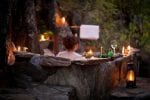
Nkwichi is entwined in the fabric of local life by the lake; it ensures guests a 5-star experience and leaves the indelible imprint of an authentic Africa in their hearts.
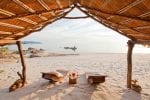
With 8 secluded beaches set on 4 km of Rift Valley coastline, Nkwichi is the perfect setting to discover a lost world; a fresh-water oasis and an Africa untouched.

Stay in wonderful chalets.
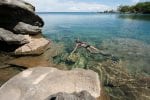
Enjoy an open air bath.
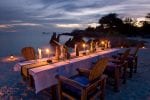
Enjoy sumptuous meals in the restaurant.

Dream sweet in a starbed on the beach.
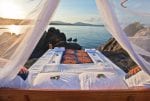
Wake up to magical views of Lake Malawi.

IN THE WATER
The crystal-clear freshwater of Africa’s most bio-diverse lake awaits you – explore secluded bays, untouched beaches, towering monoliths and an underwater world of wonder.
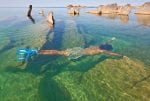
Paddle and play in the pristine fresh-water lake. Snorkel safari through a world of brilliantly coloured, tropical fish. Canoe along the magical Rift Valley shoreline. Watch the world go by in a sunset dhow cruise.

Meet the children of Lake Malawi.
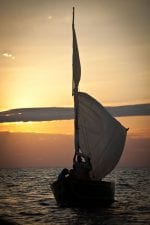
A tranquil paradise, a blessing for the mind and soul.
Trip details
Ecorating: 4.0
Season: All year round.
Airport: Lilongwe airport (LLW) Malawi then light aircraft to Likoma island.
Included: Full board, domestic flights, transfers.
Not included: Insurance, visas, items of personal nature, tipping etcetera.
Find out more about Likoma island: Likoma Island is the larger of two inhabited islands in Lake Malawi (also known as Lake Nyasa), in East Africa, the smaller being the nearby Chizumulu. Likoma and Chizumulu both belong to Malawi, and together they make up the Likoma District. Although both islands lie just a few kilometres from Mozambique, and are entirely surrounded by Mozambican territorial waters, they are both exclaves of Malawi.
Travel ethics: Lake Malawi is, in large part, a place of peace and quiet, without traffic jams and hassles of city life. The people of Lake Malawi exude friendliness. It’s common for strangers to wave and greet visitors as if they know them. It’s easy to make them smile by saying “Moni”, which means Hello in Chichewa, their local language, and “Zikomo” (thank you). Although overt friendliness often arouses suspicion, especially when someone’s trying to sell you tchotchkes, there’s hardly any hawking or selling of tacky souvenirs in Malawi – the people are genuinely friendly.
Mobile networks and email: Email and Internet access is provided. The mobile network works well.
Visa: MOST foreign nationals require a visa to enter Mozambique. Please check with the Mozambique Embassy in your country.
Time zone: GMT + 2
Vaccinations: Learn what vaccinations you need
Packing: Swimming attire, Hat, Shorts, T-shirts, Light pair of trousers, Light jumper (if you come in the cooler season), Sandals/flip flops, Prescription drugs
Toiletries bag, At least two good books, Spare glasses/sunglasses/contact lenses, Sunscreen protection, After sun if you forget the sunscreen!
Please note that your weight allowance on the light aircraft is 15kg and soft bags must be used!
Local Currency: Malawian Kwacha
Weather: Weather Maozambique
Water: Clean water available at the lodge.
Safety: Your safety is our priority. Lake Malawi is considered a low crime destination.
For more information on travel advice: Travel tips Mozambique

Ecorating: 4.0
This product meets our requirements for Ecorating, a product that is good for humans and the environment.
Does my trip make a difference?
Read more
This product meets our requirements for Ecorating, a product that is good for humans and the environment.
Nkwichi is the main support for the other two legs of the ‘African three-legged pot’ and the foremost economic driving force behind the Manda Wilderness Project. Through a bed-night levy, a portion of the revenue from each booking goes to support the conservation project and promote development in the area.
The lodge itself consists of six chalets and two private houses all designed to be low-impact and built using as much local natural material as possible such as local stones, bamboo and thatching grass. This also means, in the event of its removal, the environment would return to its natural state within 2 years. The size of the lodge has been kept deliberately small to reduce the effects on the environment.
Efforts have been made to minimise energy consumption at the lodge. The main source of power comes from solar panels and the use of petrol and paraffin is kept to a minimum. Nkwichi also works hard to reduce waste and recycle as much as possible. All kitchen waste goes to the nearby agricultural project to be used as compost; paper and cardboard are recycled to produce note sheets and cards. Used wine bottles are turned into drinking glasses and water bottles.
Nkwichi employs 41 permanent staff from neighbouring villages and sometimes up to 60 daily contractors. It is one of the biggest single employers in the whole province of Niassa. A recent survey suggested that each staff member supports 15 others from their salary; this means that the lodge directly supports the lives of over 600 people.
It is also estimated that there are knock-on benefits from the lodge for up to 11,000 people, more than half the population of the villages in the area. The lodge buys as many supplies locally as possible – including vegetables and building materials. Some of the staff, who all receive comprehensive training at the lodge, have set up their own successful businesses including accommodation, restaurants and hairdressers!
CONSERVATION
The second leg of the Manda Wilderness Project is Conservation. Nkwichi successfully protects its pristine concession of 650 hectares, with 4km of coastline, from poaching, over-fishing and uncontrolled fires. As a result zebra, warthog, kudu and otter are starting to return.
In partnership with the communities, a huge conservation area of 120,000 hectares (roughly the size of greater London) has also been established. The Manda Wilderness Community Conservation Area (MWCCA) covers an area between the lakeshore and the Messinge River, 40 km to the east. The lakeshore and escarpment have dry land forests, while thinly wooded savannah and marsh land exists on the plateau. It is a pristine wilderness area with great potential for both wildlife and tourism. Recent wildlife sightings include wild dog, elephant, bushbuck, reedbuck, duiker, sable, hippo and leopard.
The aim of the MWCCA is to encourage villagers to work together to make the most of their natural resources and to avoid over-using them. With the help of local NGOs, Nyanja communities have agreed to stop hunting wild animals and cutting wood for export. Instead, they focus on agriculture and tourism activities which should produce better long-term results.
Community participation has been constant throughout the 12-year project. A local community association, known as UMOJI (meaning ‘As One’) has been formed to represent all 16 villages within the area. UMOJI, of which Nkwichi Lodge is a founding member and sits on the current Council of Direction, legally owns and manages the conservation area. Each of the communities also hold the titles to their own community land.
The next stage in this project is to arrange training for the UMOJI association to help it manage the conservation area while implementing a professional management plan for the MWCCA which was suggested in 2009 and approved by the Mozambique Government in 2011. The area will then be opened to tourists who will pay fees for visiting the reserve. This revenue will be used to help cover the running costs for MWCCA, with any surplus going to UMOJI.
The success of the Manda Wilderness Community Conservation Area will put the communities’ destiny in their own hands, giving them a sustainable resource for future generations.
COMMUNITY DEVELOPMENT
The third leg of the African pot is the Manda Wilderness Community Trust (MWCT), established as a UK Charity in 2004.
It is run by an independent board of trustees appointed for their expertise in African development. MWCT acts as the primary vehicle for funding local development projects and raising funds for local NGOs already active in Niassa Province. Donations have come from guests at the lodge, friends, schools and churches in Europe and the US as well as donor government development agencies working in Mozambique.
There are 16 villages working with MWCT and each village has a development committee which discusses and approves their most urgent development project. All projects are managed as a partnership between the both sides, with contributions from each. MWCT provides more expensive materials and technical expertise while the villages contribute their time and energy and any local materials needed. The village itself must take responsibility for the project. In this way the development programme gets active community participation and provides people with better skills.
The activities of the Manda Wilderness Community Trust include:
- Construction thus far of 12 primary schools in the area
- Construction of the district’s first maternity clinic
- Construction of the district’s first Girls’ Boarding House
- Small business and vocational training
- Agricultural extension to over 500 farmers in the area through the Manda Wilderness Agricultural Project.
- Organisation of sporting and cultural events such as the annual Traditional Dug-out Canoe Race and the Community Gospel Choir Festival



